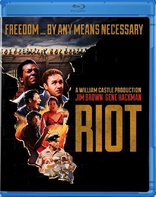Riot Blu-ray Movie
HomeRiot Blu-ray Movie 
Olive Films | 1969 | 96 min | Not rated | Sep 17, 2013Movie rating
7.1 | / 10 |
Blu-ray rating
| Users | 0.0 | |
| Reviewer | 3.0 | |
| Overall | 3.0 |
Overview
Riot (1969)
They exploded the ugliest riot in prion history to cover their dangerous, desperate break for freedom.
Starring: Gene Hackman, Jim Brown, Mike Kellin, Ben Carruthers, Clifford DavidDirector: Buzz Kulik
| Crime | Uncertain |
| Drama | Uncertain |
Specifications
Video
Video codec: MPEG-4 AVC
Video resolution: 1080p
Aspect ratio: 1.78:1
Original aspect ratio: 1.85:1
Audio
English: DTS-HD Master Audio Mono
Subtitles
None
Discs
25GB Blu-ray Disc
Single disc (1 BD)
Playback
Region A (B, C untested)
Review
Rating summary
| Movie | 2.5 | |
| Video | 3.5 | |
| Audio | 3.5 | |
| Extras | 0.0 | |
| Overall | 3.0 |
Riot Blu-ray Movie Review
Quiet riot.
Reviewed by Jeffrey Kauffman September 13, 2013William Castle is a name associated almost exclusively with the horror genre, and the kitschy, gimmick laden horror genre at that. Castle was lovingly parodied by John Goodman in Matinee, but Castle himself was kind of a living parody in and of itself, a bigger than life producer who thrived on luring audiences to the theaters with all sorts of ridiculous techniques like Emergo or Percepto or even Illusion-O (Castle obviously had a thing for final “o”’s). Castle finally got some mainstream prestige in 1968 when he produced the sensational Roman Polanski adaptation of Ira Levin’s Rosemary's Baby, but in a cruel twist of fate, illness sidelined Castle just when it seemed he might finally join the ranks of bona fide A-listers, and by the time he recovered, he was once again consigned to less than stellar outings like 1969’s Riot, the kind of gritty but lackluster drama that was then regular fodder on television outings like ABC’s Movie of the Week. In fact Riot’s director Buzz Kulik had made the bulk of his mark in Hollywood working in series television, and he would soon go on to helm a number of highly praised made for television movies, including A Storm in Summer and what remains one of Kulik’s most fondly remembered pieces, Brian’s Song. Riot has a rather interesting ambience, having been filmed almost completely in the environs of what the film generically calls the Arizona State Prison, but which IMDb identifies as Yuma Territorial Prison in Arizona. Many real life prisoners as well as the then current warden of the prison are on hand as well, lending an unusual feeling of verisimilitude to some of the desperate machinations of a bunch of men who take control of a cellblock and attempt to stall while they figure out a way to break free.
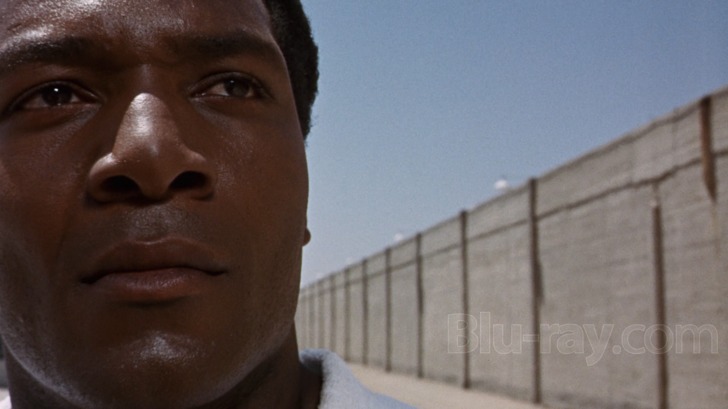
Riot is a fascinating film in some respects, echoing a time which was sandwiched in between the massive urban unrest which had visited major American cities in the late sixties and what would become one of the most infamous prison uprisings of all time, 1971’s outbreak at Attica. James Poe’s screenplay nicely captures a tense but weirdly languid era where a character like Cully Briston (Jim Brown) drifts through his relatively brief incarceration while quietly seething at the unfair treatment he receives at the hands of prison guard Grossman (Gerald S. O’Loughlin). It is in fact Grossman’s harassment of Cully that gets Cully involved—seemingly unwillingly—in what turns out to be a massive prison break scheme perpetrated by mastermind Red Fraker (Gene Hackman, still at a point where he received second billing to Brown, despite just having come off of his Academy Award nomination for Bonnie and Clyde).
The film plays on some then current liberal leanings insofar as the prisoners decide to distract the warden (real life warden Frank Eyman) and a bunch of armed cohorts by stating that the “riot” isn’t really a riot, but a peaceful protest made in order to better the living conditions. There’s an ironic twist here, of course, in that the prisoners are “gaming the system”, relying on the sympathies of press personnel in order to stall while a long abandoned escape tunnel is readied for an ultimate run for freedom.
Riot in fact only has a few moments of what might actually be termed a real riot, and instead is a slow boiling stew of barely tamped down violence which actually does explode on several occasions. The film is perhaps most notable (some might say notorious) for a brief interlude in a wing where the “deviants” (meaning homosexuals) are kept, through which Cully wanders at one point, even receiving a kind of salacious proposition from one of the cross dressing men (Clifford David). It’s a different kind of gimmick that Castle employs here, one meant obviously to shock rather than provoke fear, but it’s patently odd and some may even find it mildly offensive.
Riot is curiously restrained just when it seems most coiled to erupt into a viscerally exciting action sequence. Both Cully and Red turn into contemplative monologists during an extended middle section, depriving the film of the forward momentum which was at least adequately sparked by the opening scenes. The saving grace here may well be the performances. Brown, while typically stalwart and understated, brings a certain dignity and grace to his portrayal. There’s a fantastic dream scene after Cully has imbibed a little moonshine where Brown doesn’t say a word and yet his face reveals all the hope and longing of a man desperately praying for freedom and justice. It’s one of this film’s standout sequences (and not just because of the scantily clad women Cully fantasizes surround him approvingly). Hackman is alternately hyperbolic and ruminative. It’s an interesting if not wholly successful performance by the actor, one that seems to wrestle with the screenplay’s bifurcated view of the character. Is Red supposed to be a noble freedom fighter or merely a scheming con? It’s never really clear, and Hackman’s presentation is at times similarly muddled, though never less than watchable.
Riot does have one more interesting element which may be of some interest to those who, like I do, pay attention to film scores. Christopher Komeda (often transliterated Krzysztof Komeda, per Polish norms) was a Polish composer and pianist who helped usher in a sort of Third Wave in Polish jazz and who went on to score a number of Roman Polanski’s early iconic films like Cul-De- Sac and Knife in the Water. Komeda seemed primed for the American big time when he scored Polanski’s film version of Rosemary's Baby, creating a score that produced a bevy of cover recordings of its haunting main lullaby theme, but which was inexplicably passed over when the Oscar nominations came out that year. Komeda was one of several people caught up in the so-called “Rosemary’s Baby curse”, dying shortly after the film came out under somewhat mysterious circumstances that have been variously reported by different people. Komeda must have just barely had enough time to have completed Riot before his untimely demise. His score here is manifestly different than his Rosemary’s Baby work, including a kind of quasi-Country theme (which recurs throughout the film) sung by the Righteous Brothers’ Bill Medley.
Riot Blu-ray Movie, Video Quality 
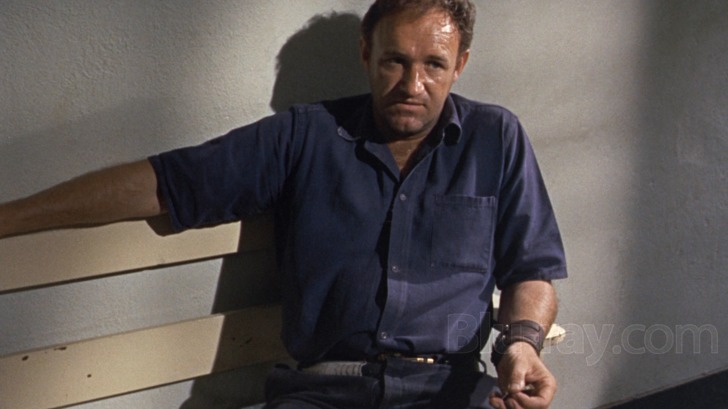
Riot is presented on Blu-ray courtesy of Olive Films with an AVC encoded 1080p transfer in 1.78:1. The elements utilized for this high definition presentation are in very good shape, perhaps due to the fact that this film never made much of an impact on broadcast television, ostensibly due to some of its more provocative sequences. While there is some age related damage to report, it's relatively minor as these things go and never proves to be a major distraction. Colors are nicely saturated and robust, but they do appear to have faded just slightly, tilting toward the brown end of the spectrum. There are some minor contrast issues in some of the interior scenes, especially the sequences inside the tunnel, where it's often hard to make out exactly what's going on. By and large, though, this is a solid looking transfer which follows in the reliable Olive tradition of neither overt restoration nor overt digital tweaking.
Riot Blu-ray Movie, Audio Quality 
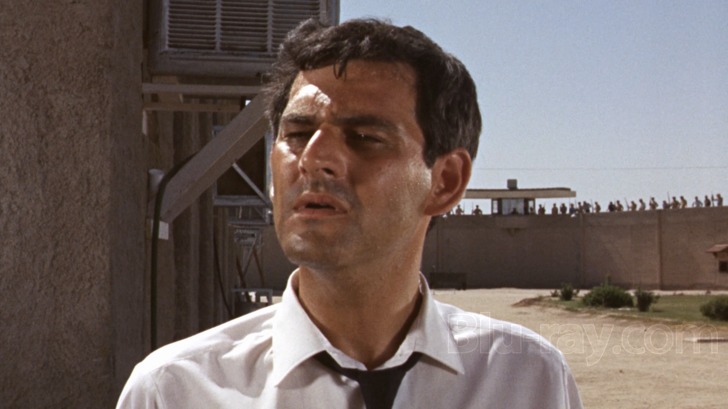
Riot features a lossless DTS-HD Master Audio Mono track that has no damage to report and which faithfully recreates the film's fairly unambitious sound design. While there are some bursts of activity here which give the film decent dynamic range, courtesy of such activities as several fights which break out, and late in the film the explosion of tear gas cannisters, a lot of the film is actually more dialogue driven, something this mono track delivers with fine fidelity. Christopher Komeda's score, which evidently rubbed some critics the wrong way when the film was originally released, features a nice main theme sung by Bill Medley which recurs throughout the movie and which sounds fine in this lossless setting.
Riot Blu-ray Movie, Special Features and Extras 
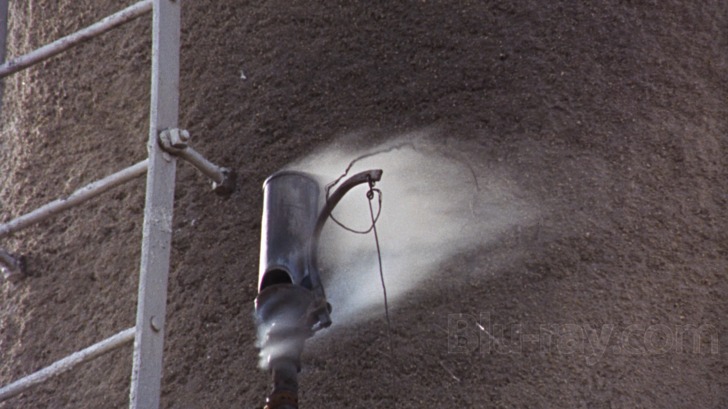
No supplements are offered on this Blu-ray disc.
Riot Blu-ray Movie, Overall Score and Recommendation 
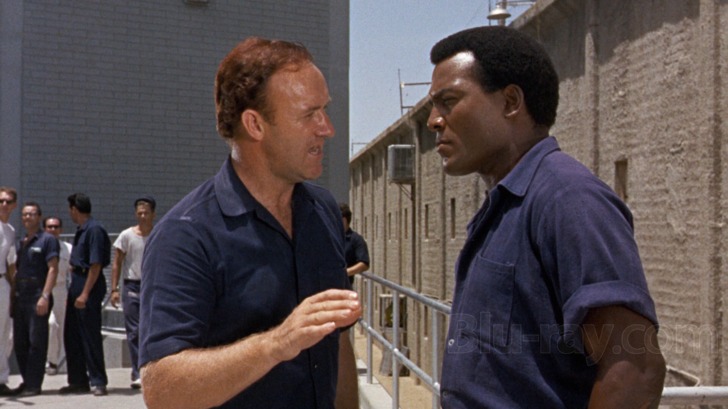
Riot seems to be setting itself up to be a rootin' tootin' adventure yarn with a bunch of desperate criminals "gaming the system" while they prepare a daring escape. Unfortunately, the film never really works up much of a head and steam, and instead dissipates in a bunch of quasi-philosophical monologues by Cully and Red. A couple of exciting sequences and a pretty gruesome ending hint at the lurid B-movie lurking just beneath the surface of this politically ambivalent statement, but Castle would have done better to have just resolutely gone the trashy route here rather than trying to invest the film with so much "meaning". This Blu-ray features very good video and audio and may be of some interest to those who like the stars. A few discerning people will want to check this out for its Christopher Komeda score.
Similar titles
Similar titles you might also like

I Am a Fugitive from a Chain Gang
1932

Big House, U.S.A.
1955

Crashout
Gunmen on the Loose
1955

Each Dawn I Die
Warner Archive Collection
1939

You Only Live Once
1937

Raw Deal
Reissue | Special Edition
1948

The Defiant Ones
1958

White Heat
1949

The Desperate Hours
1955

The Chase
Limited Edition to 3000
1966

Brute Force
1947

The Glass House
1972

The Criminal
Concrete Jungle
1960

They Live by Night
1948

The Limey 4K
1999

The Killer Is Loose
Special Edition
1956

Appointment with Crime
1946

Cry of the City
1948

I Walk Alone
1948

Kiss Tomorrow Goodbye
1950
